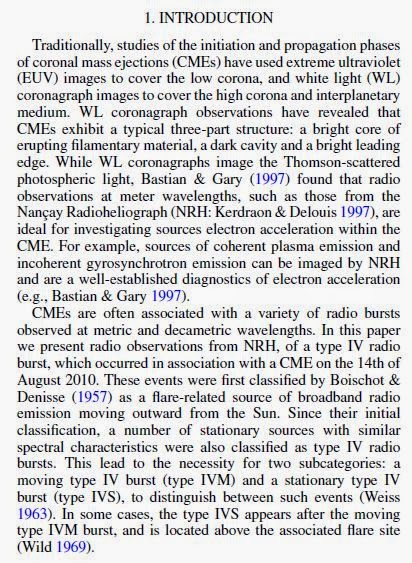I take note of Bain, H. M.; Krucker, S.; Saint-Hilaire, P.; Raftery, C. L. 2014:
http://adsabs.harvard.edu/abs/2014ApJ...782...43B
Abstract: "Propagating coronal mass ejections (CMEs) are often accompanied by burst signatures in radio spectrogram data. We present Nançay Radioheliograph observations of a moving source of broadband radio emission, commonly referred to as a type IV radio burst (type IVM), which occurred in association with a CME on the 14th of August 2010. The event was well observed at extreme ultraviolet (EUV) wavelengths by SDO/AIA and PROBA2/SWAP, and by the STEREO SECCHI and SOHO LASCO white light (WL) coronagraphs. The EUV and WL observations show the type IVM source to be cospatial with the CME core. The observed spectra is well fitted by a power law with a negative slope, which is consistent with optically thin gyrosynchrotron emission. The spectrum shows no turn over at the lowest Nançay frequencies. By comparing simulated gyrosynchrotron spectra with Nançay Radioheliograph observations, and performing a rigorous parameter search we are able to constrain several key parameters of the underlying plasma. Simulated spectra found to fit the data suggest a nonthermal electron distribution with a low energy cutoff of several tens to 100 keV, with a nonthermal electron density in the range 100-102 cm-3, in a magnetic field of a few Gauss. The nonthermal energy content of the source is found to contain 0.001%-0.1% of the sources thermal energy content. Furthermore, the energy loss timescale for this distribution equates to several hours, suggesting that the electrons could be accelerated during the CME initiation or early propagation phase and become trapped in the magnetic structure of the CME core without the need to be replenished."














